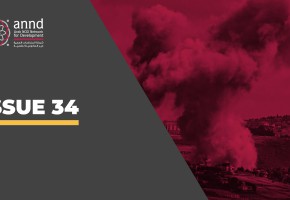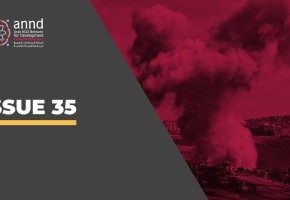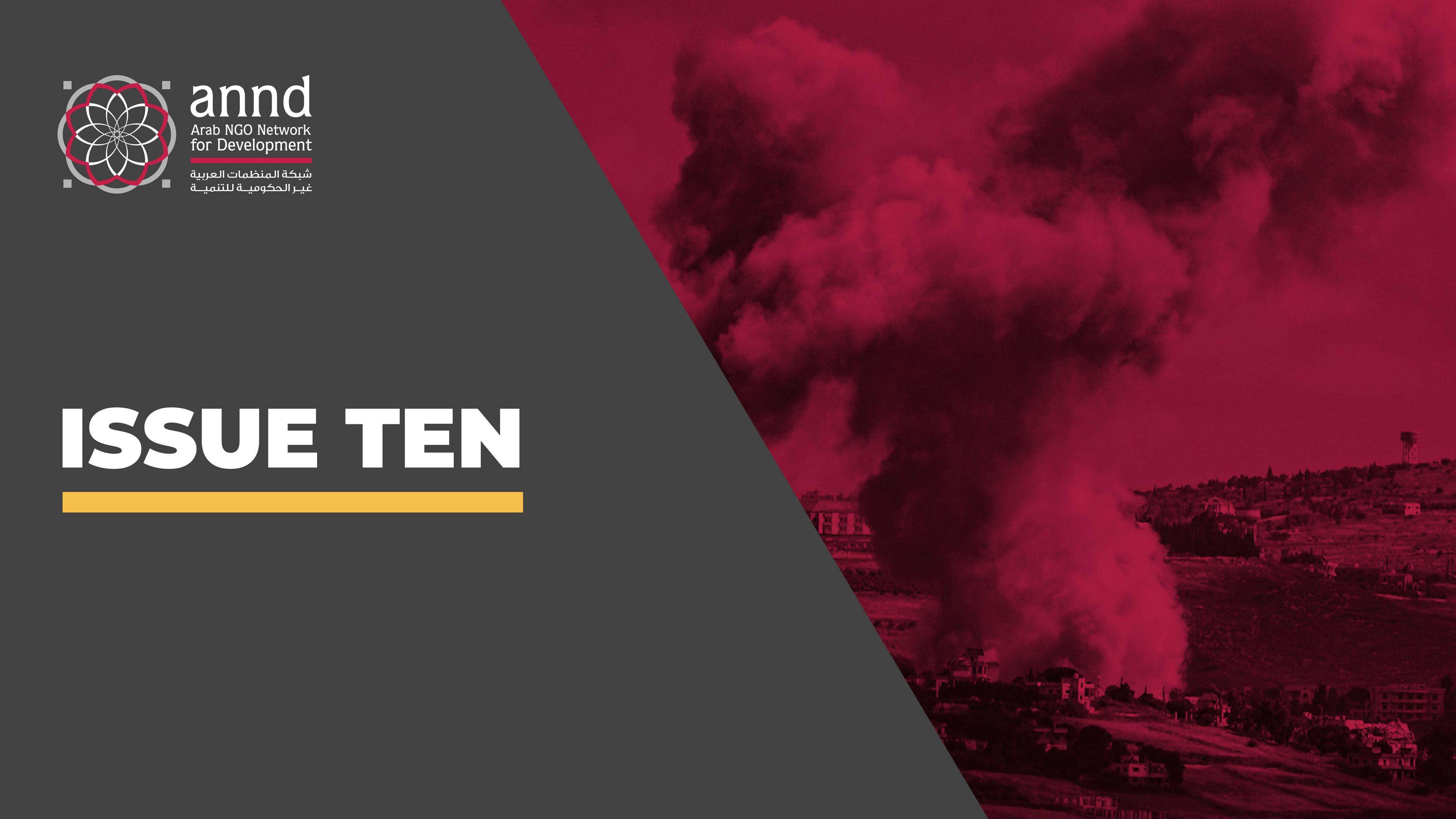
A Region on Fire
Issue 10 – October 6, 2024
A Year After the Al-Aqsa Flood
"We are in a state of high alert and readiness on the eve of the anniversary of October 7th last year." This is what Israel announced, and it has begun executing this through escalating aggression in northern, southern, and central Gaza, while also targeting Lebanon with the most intense airstrikes on the southern suburbs of Beirut.
Meanwhile, on Sunday protests took place in several countries around the world, including the United States, the UK, France, South Africa, and Morocco, in support of Gaza one year after the war began. In Washington, a man who identified himself as a journalist attempted to set himself on fire during a demonstration in front of the White House, which was attended by over a thousand people carrying Palestinian and Lebanese flags. Many participants called for the cessation of U.S. military aid to Israel, the strategic ally of the U.S.
Gaza: Back to Square One
The Israeli army launched an attack across all parts of the Gaza Strip at the same time as the Al-Aqsa Flood operation began last year.
Early Sunday morning, Israeli warplanes bombed a mosque in Gaza, killing 26 Palestinians, according to the Palestinian Ministry of Health. The airstrike targeted a mosque that was sheltering displaced people near Al-Aqsa Martyrs Hospital in the town of Deir al-Balah, amid ongoing military escalation in the area.
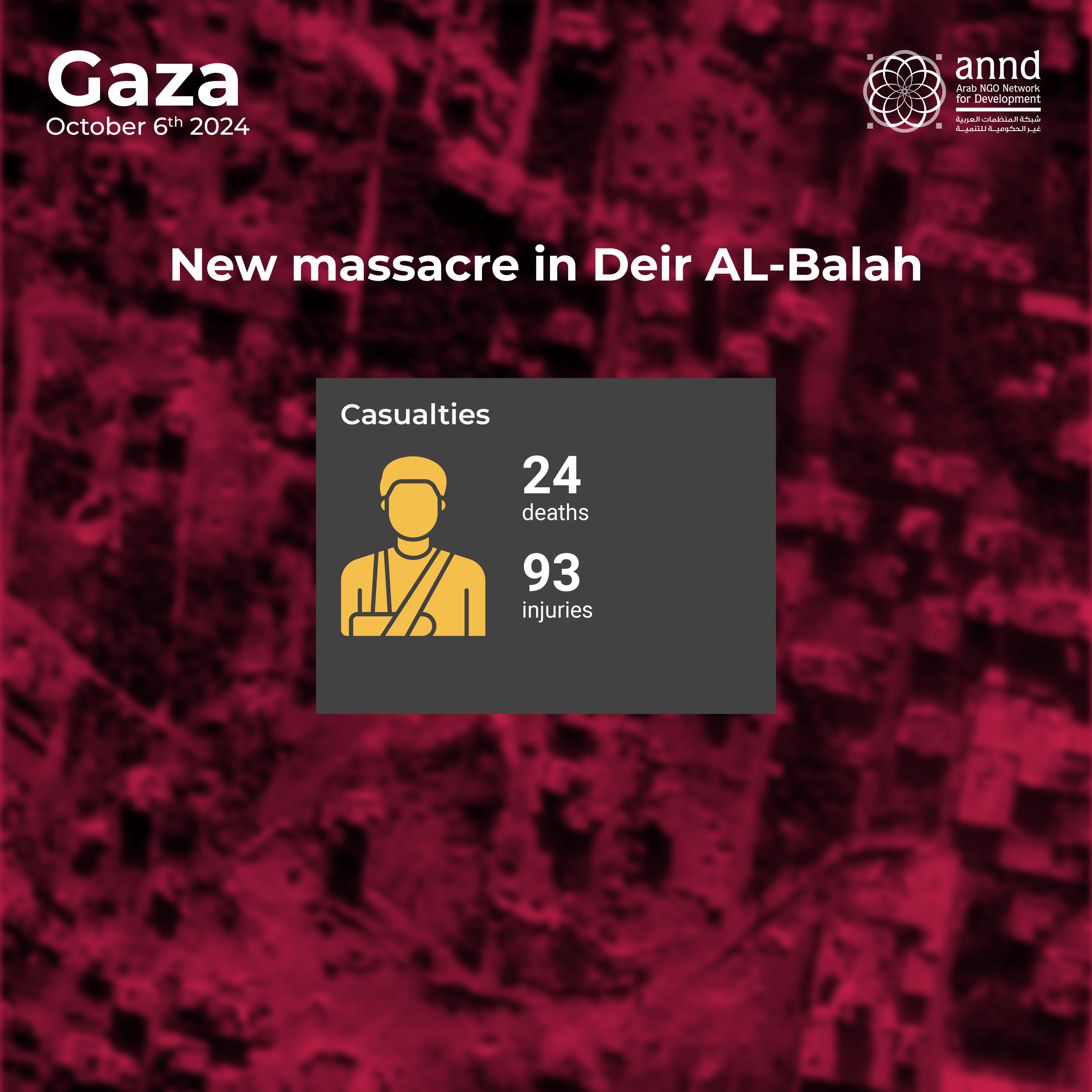
The Jabalia area in Gaza witnessed a mass displacement in the past few hours, coinciding with orders to evacuate northern areas and continuous Israeli army operations and artillery shelling. The Israeli army reported that its forces completed the encirclement of the Jabalia area in Gaza and moved the 162nd Division from Rafah to Jabalia after completing its mission in the south.
These developments came after another massacre in Deir al-Balah, where over 24 Palestinians were killed, and 93 others injured. Additional Palestinians were killed or injured in the shelling of schools sheltering displaced people in central Gaza.
On Sunday, the Israeli army deployed more troops around Gaza. Earlier, it announced that its forces had "encircled" the Jabalia area in northern Gaza, assessing that Hamas was rebuilding its capabilities there after months of fighting and airstrikes.
On the anniversary of the Al-Aqsa Flood operation, Hamas leader Khalil al-Hayya stated that the events of October 7th last year shattered the illusions of Israeli superiority. He confirmed readiness for an agreement that would halt aggression, end the blockade, and lead to a serious prisoner exchange deal.
Shooting Incident in Beersheba
On Sunday, a young Palestinian carried out a shooting attack against several Israeli soldiers at the central bus station in Beersheba. Israeli army radio confirmed the death of an Israeli female soldier and the injury of 10 others after the attacker stabbed the soldier and took her weapon. Israeli Channel 12 reported that 10 Israelis were transferred to hospitals following the Beersheba attack, and the Israeli police announced that the shooter, a resident of the Negev, was shot and killed.
Lebanon: Battlefield Developments
Lebanon endured a night of hell, particularly in the southern suburbs of Beirut, with over 30 Israeli airstrikes recorded between dawn and morning, marking the most intense night since the start of Israel’s air invasion of Lebanon. The eastern part of Beirut’s airport experienced a power outage, and a fuel station and medical supply warehouse were hit. Reports indicated that Israel used *Bunker-Buster* bombs containing depleted uranium, banned internationally according to the Vietnam Veterans Against the War (VVAW). The Syndicate of Chemists In Lebanon indicated that the extent of destruction, including deep penetration of buildings and land, suggested the use of depleted uranium bombs, and the Ministry of Health is investigating the matter.
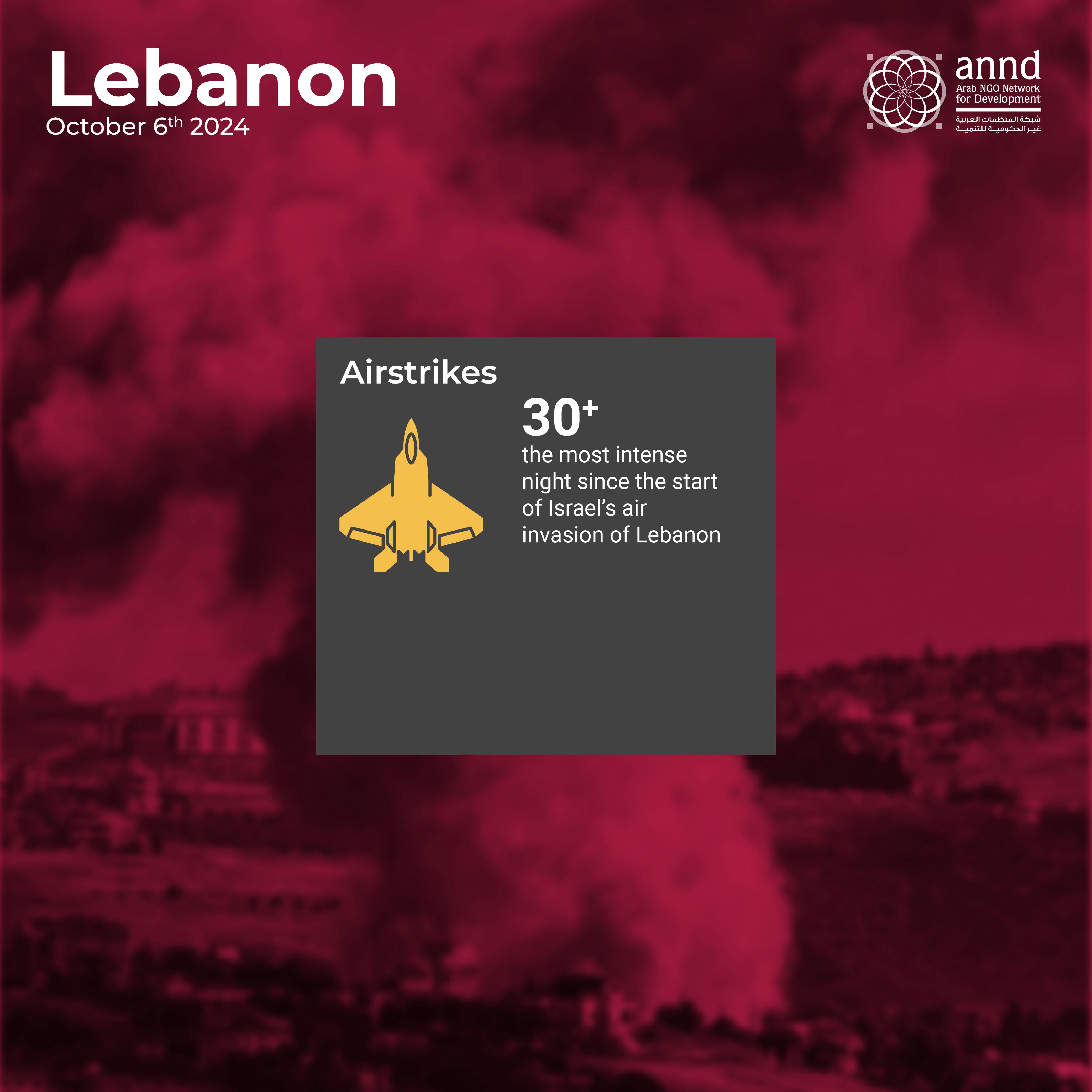
Airstrikes continued throughout the day in various parts of southern Lebanon, the Beqaa, and Beirut’s southern suburbs. Israel also launched an airstrike near the historic Baalbek site and targeted areas in Mount Lebanon, such as Kayfoun and Qamatiyeh (predominantly Shia villages in the Aley District).
The “Washington Post” revealed details about an operation to sabotage Hezbollah's communication devices, claiming Israeli intelligence had been planning it since 2022. According to Israeli officials, Hezbollah's pagers were made in Israel under Mossad supervision. The report added that Mossad had been spying on all Hezbollah communications since 2015 and knew the location of former Hezbollah Secretary-General Hassan Nasrallah but chose not to assassinate him.
While Beirut faced intense bombardment, Israeli Prime Minister Benjamin Netanyahu visited his forces stationed at the northern border on Sunday, touring the 36th Division base. He praised the soldiers, saying, "The world is astonished by the blows you are dealing to our enemies, and I salute you. Together, we will fight, and together we will win."
The Lebanese Ministry of Health's emergency operations center reported on Sunday that Israeli airstrikes had killed 23 people and injured 93 others.
Political Developments
Lebanese Prime Minister called for international pressure on Israel to cease its aggression against Lebanon, enforce an immediate ceasefire, and implement UN Security Council Resolution 1701. He expressed support for a joint appeal issued by France and the U.S., backed by the European Union and Arab countries and others, to stop the fighting, and thanked French President Emmanuel Macron for supporting Lebanon. He also noted that Lebanon could no longer bear the burden of Syrian refugees, adding that thousands of Lebanese are now displaced within their own country. Turkey’s Foreign Ministry confirmed its readiness to support Lebanon with humanitarian needs.
The Speaker of Parliament denied rumors attributed to him about negotiation channels, clarifying through his office that he had made no statements. Maronite Patriarch Cardinal Bechara Boutros al-Rahi criticized the two-year delay in electing a president as a crime by Parliament, calling on officials to put aside disagreements and elect a president trusted nationaly and internationally to implement Resolution 1701 and stop the war.
Amid the escalation, Hezbollah MPs reiterated the need for a ceasefire and affirmed support for a peace initiative proposed by political leaders, including Speaker Nabih Berri and Prime Minister Najib Mikati, calling for an immediate ceasefire and implementation of Resolution 1701. The Lebanese government stated its readiness to deploy the army to the south, provided it receives the necessary equipment, which it currently cannot afford.
Humanitarian Response
The President of the Private Hospitals Syndicate warned that the healthcare sector was entering a dangerous zone due to Israel's bombardment near hospitals, rendering them non-operational. Hospitals in safer areas are unable to accommodate patients in intensive care, particularly those needing ventilators and dialysis. The World Health Organization reported that Lebanon’s health system was deteriorating, and medical supplies from the UN could not be delivered due to challenges at Beirut’s airport.
The International Committee of the Red Cross and Red Crescent issued a statement calling for the protection of healthcare workers, in compliance with international humanitarian law.
Lebanon’s Civil Defense Director-General reported the death of six civil defense members and the injury of 29 others during rescue operations amidst Israeli airstrikes.
Education Minister Abbas Al-Halabi announced the postponement of the school year for public schools until November 4th and allowed private schools to offer remote learning. He required schools opting for in-person learning to secure parental approval and take full responsibility for the decision. The Lebanese University will also remain closed for the time being. It is estimated that the Israeli assault displaced over 464,000 students and 35,000 teachers. Relief agencies have previously reported that 505 public schools, 54 public vocational institutes, and more than 50 private schools have been transformed into centers for sheltering displaced persons.
The UN High Commissioner for Refugees (UNHCR) pledged cash assistance for 200,000 displaced Lebanese and launched a relief campaign supported by the UAE from the 8th till the 21st of October. UN appeals have met 40% of the estimated $437 million required for three months of aid.
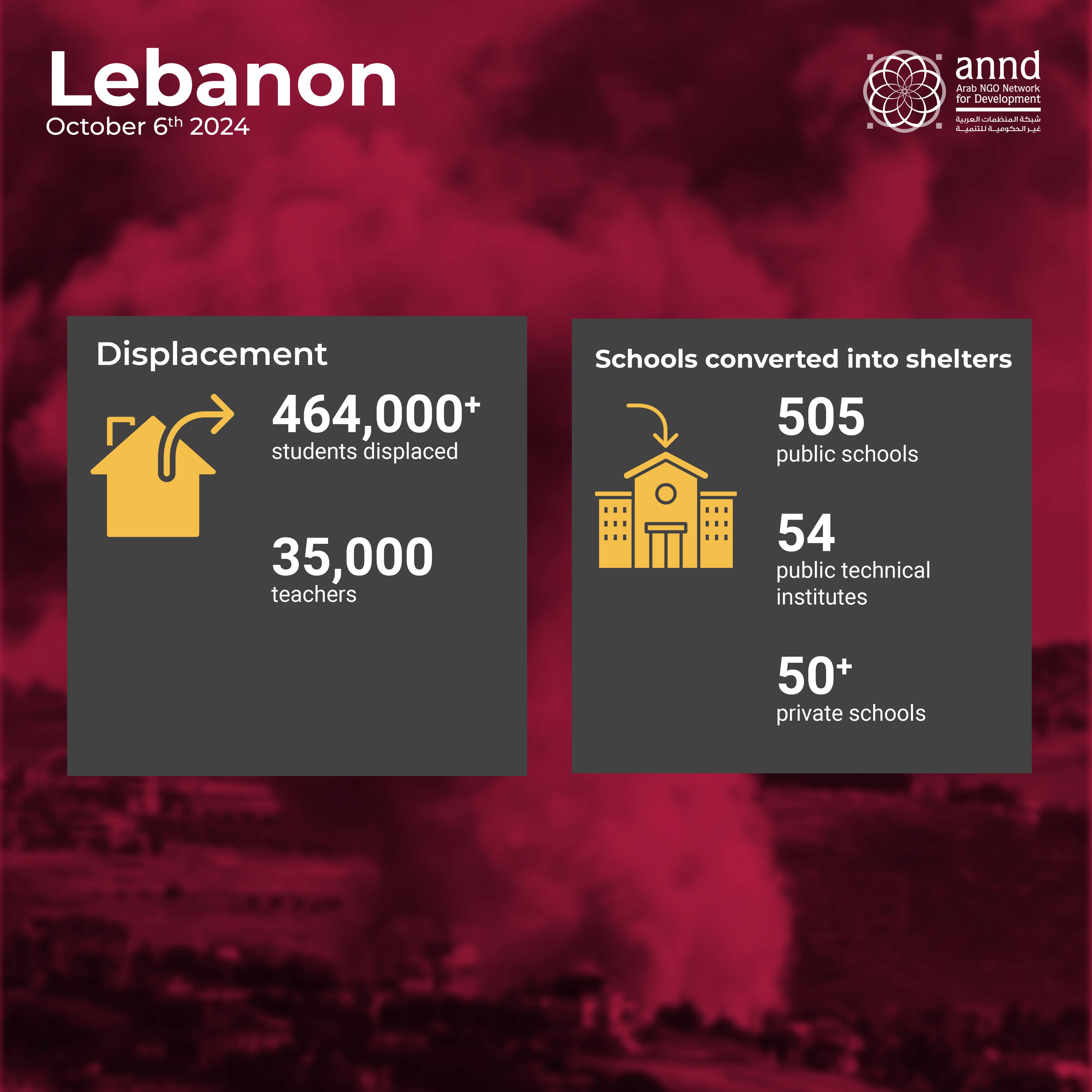
International Positions
UN Secretary-General António Guterres said that Israel's war on Gaza, which began a year ago, continues to devastate Palestinians and inflict immense humanitarian suffering.
The UN Interim Force in Lebanon (UNIFIL) reaffirmed its commitment to its mandate under Resolution 1701 and condemned Israeli violations of Lebanese borders as breaches of international law. British Prime Minister warned that the Middle East conflict threatens to engulf the region. Germany's Chancellor remarked that peace in the Middle East now seems further away than ever. The Iraqi Prime Minister warned that the region was on the verge of a dangerous slide that could disrupt the global economy and set back development.
Jordan’s King Abdullah II, during talks with Spain’s King, called on the international community to take responsibility for ending Israel’s war on Gaza and Lebanon. U.S. Vice President Kamala Harris expressed concern about Lebanon's worsening humanitarian situation and announced $157 million in additional U.S. aid.
Israeli President Isaac Herzog urged Middle Eastern political forces to unite against Iran and form a NATO-like alliance to confront what he described as extremists.
The ongoing dispute between Israeli Prime Minister Netanyahu and French President Emmanuel Macron continues, after Macron's statement at the Francophonie summit, where he called for halting arms supplies to Israel, which he said were fueling the war on Gaza. Netanyahu argued that a “weapons ban” on Israel would strengthen Iran.
Recent publications


